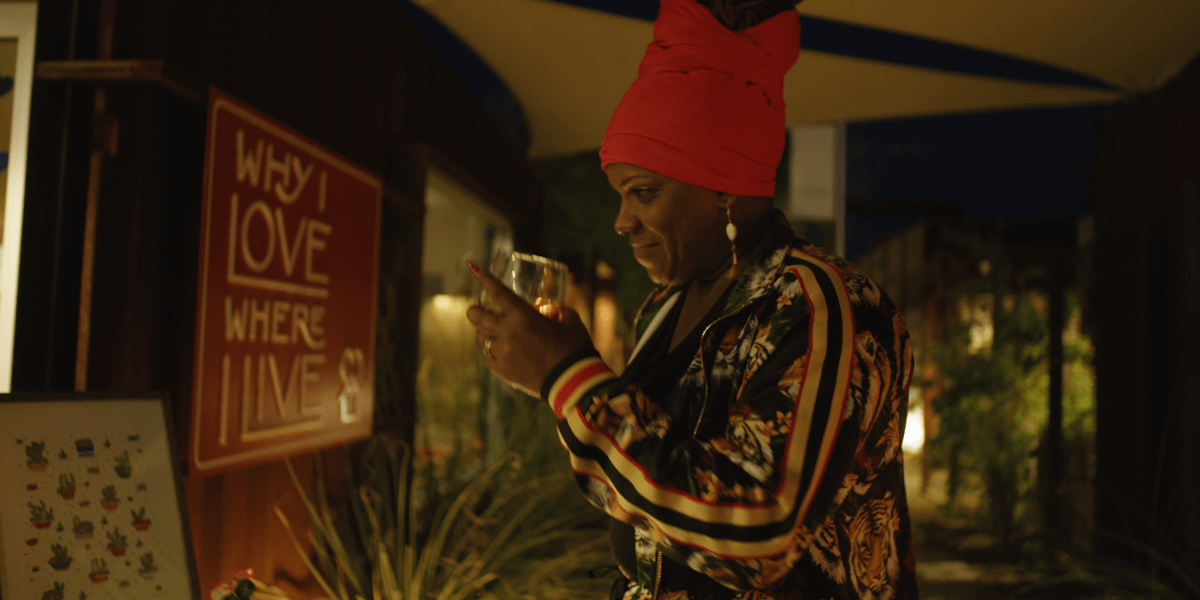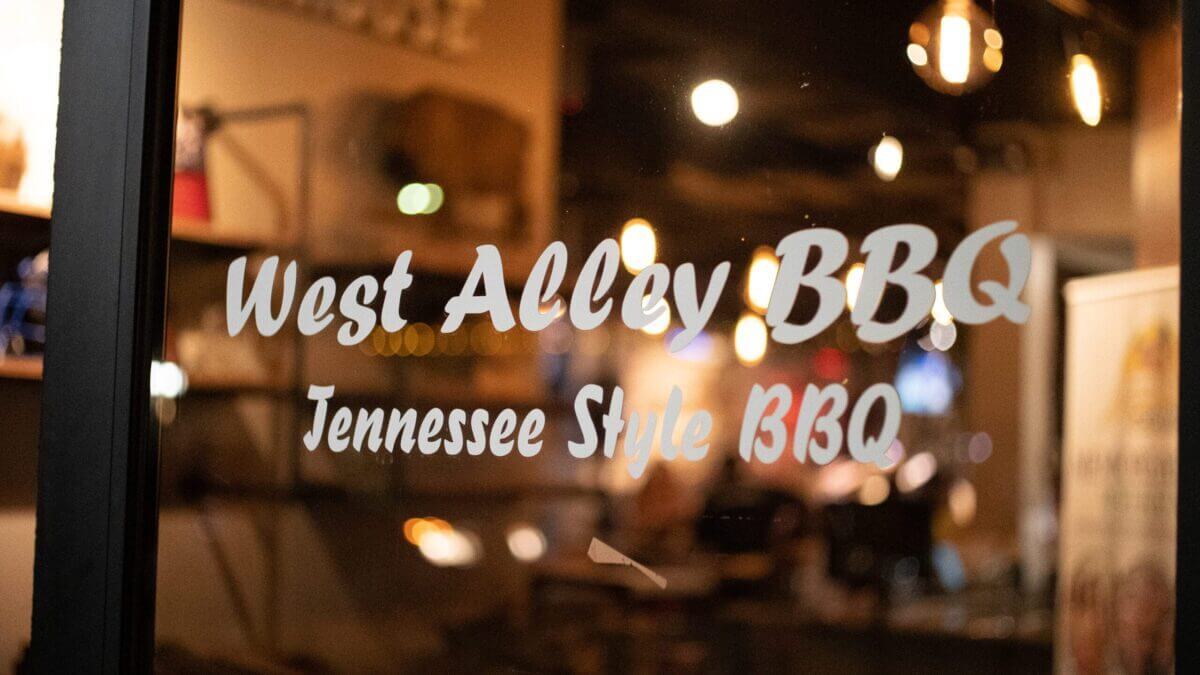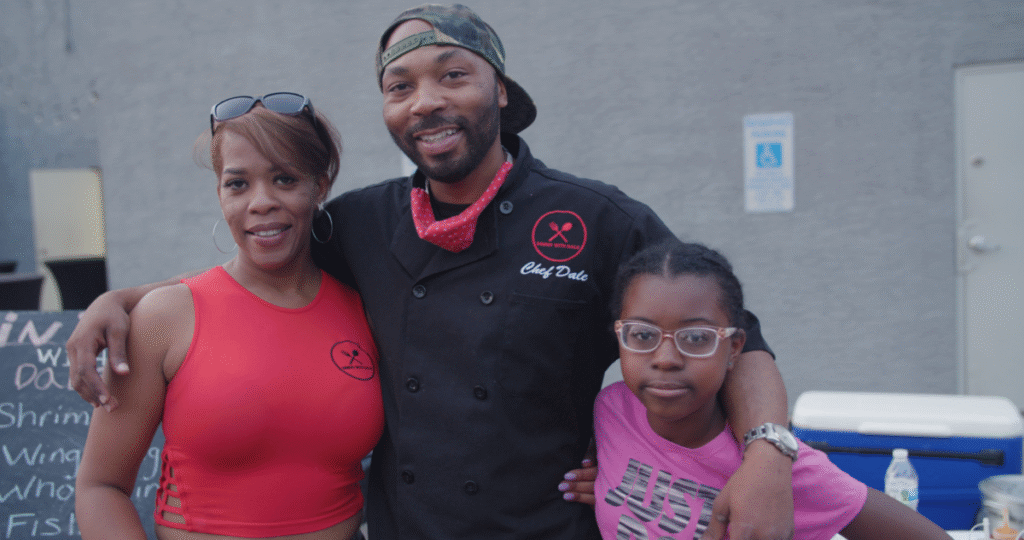THE AROMA OF CIGAR SMOKE and disappointment brought so much traction, so much visibility, not just for us, wafts through the air as Christian Brantley nurses a drink with his business partner at a Scottsdale cigar bar. Hours earlier, they learned that a deal fell through that would have seen Christian’s Tennessee-based West Alley BBQ find a new home in Scottsdale. At that moment, Christian was stuck in the desert without a home.
But, as is often the case, talking the issue out leads to a solution. By chance, a bartender overheard the men talking about the deal falling through and offered to help. He gave them some names to contact and told them about an upcoming barbeque festival in nearby Chandler, giving the pair some hope in the midst of a bad situation.
Christian figured running a stand at the festival would be no sweat. After all, he’d been cooking barbeque his entire life, along with his father, Bardo, who started West Alley BBQ about 8 years ago in Jackson, Tennessee. Bardo had moved to Chandler a year earlier, often urging Christian to visit.
While on vacation, Christian found himself equally delighted with Chandler, a place he never knew existed. For Christian, the decision to expand was easy, especially with “perfect weather” compared to the frigid Tennessee winters.
But first, Christian had to turn some heads at the festival. He initially thought the event attracted about 30,000 guests but soon learned that the real number was more like 300,000, which would not only require more effort, but a lot more product. Since West Alley lacked an Arizona location, they were forced to use Bardo’s house to prepare.
“I had to rent a Uhaul to bring all the meat back to his house,” Christian says. “We cooked with so much vinegar that everybody was crying.”
The hard work paid off and West Alley “killed it” at the festival, attracting long lines for hours before completely selling out by noon. With all these happy customers singing the praises of West Alley, it was easier for Christian to set up shop in downtown Chandler.
At first it was difficult for Christian to find a network of like-minded Black-owned businesses. Regardless, Christian reached out to the community and fortunately found no shortage of support.
Christian says that Chandler now “calls us their own” and that the community’s support has been instrumental in their success. “Every neighborhood in Phoenix seems to have their own personal barbeque spot and Chandler is proud to have us as theirs,” he says. “This location has but for downtown Chandler.”
FINDING THE OTHERS
West Alley BBQ’s initiation into the Chandler community serves as an illustration of the networks that web the sprawling city of Phoenix. Rather than thinking of Phoenix as one large metropolis, it’s more helpful to think of it as a series of smaller, interconnected communities.
For African Americans, who make up just 4% of Arizona’s population, these networks often need to extend beyond the city, across the state. This contrasts with areas like Atlanta, Chicago, or Christian’s native Tennessee, where the Black community makes up a higher percentage of the population. Because of the sprawling nature of Phoenix, the presence of a thriving Black business community might not be immediately visible to outsiders.
This sense that the Black community is “siloed” became Ashley LaRussa’s motivation behind creating the Blax Friday project, which compiles an extensive list of Black-owned businesses on their site and app. Ashley began the project in 2019 when she wanted to “branch out from the 9 to 5” and set out to establish a business promoting Black businesses and events.
In the process, she sought out Arizona’s Black- owned businesses to “gain more knowledge about their challenges and what they’d gone through.” However, she found it difficult to locate other Black-owned businesses in the area.
“We didn’t have anything to find each other,” she says. “There was no central database to catalog black-owned businesses in Arizona.”
IT’S BLAX FRIDAY
Blax Friday began as nothing more than a hashtag, a way for Black-owned businesses to find each other and discuss their challenges and triumphs in a supportive space. To Ashley’s surprise, the hashtag grew quickly, filling a longstanding void for the state’s Black business community.
Fast forward to the summer of 2020 and the nation is on edge. The events surrounding the death of George Floyd ignited a sense of urgency in supporting our nation’s Black communities, including its business ecosystem. But as people clamored to support Black-owned businesses, they found themselves with the same issue as Ashley of not having a centralized database.
That’s when Ashley realized that her hashtag project was something much bigger.
After over a year of curating a spreadsheet of Black- owned businesses, Ashley sat on a treasure trove that the public wanted. Within a month, Ashley and her team converted the list to a website, designed it from the bottom up, and launched an accompanying app. From the start, Blax Friday set out to be all-inclusive, covering the entire gamut of the Black community and refusing to charge a fee so as not to be perceived as a “gatekeeper.”
“We use this term ‘Black community’ as a catch-all but it can mean different things, such as church-goers, LGBTQ, folks on military bases, artists or students,” Ashley says. “We wanted to make it known that, collectively, we’re here for business.”

ENTREPRENEURSHIP IS THE NEW BLACK
Southern Arizona has grown tremendously over the past decade, thanks in part to its university network and entrepreneurship ecosystem. However, like most states across the country, African Americans have been underrepresented in the entrepreneurial space.
While the average employer firm in the state had 23 employees and $5.4 million in revenue, Black-owned firms had 10 employees and generated $1.1 million in revenue, according to the 2021 State of Black Business report.
Local First AZ is one of many organizations trying to “change the narrative” about Black-owned businesses and create a more inclusive business community across the state. Last year, Local First launched the We Rise program to help Black entrepreneurs grow their businesses by teaching fundamentals and providing resources.
“Given that we are 4% of the population, we want African Americans to be part of the mission because we
believe that entrepreneurship is key to development in the state,” says We Rise Senior Manager Carmen Attikossie. “We want as many people, and groups of people, to participate as possible.”
Carmen was brought onto We Rise after establishing similar programs for students in Mauritius and Rwanda. She creates the curriculum for the We Rise classes, where entrepreneurs design their own business plan over a five-week intensive workshop, and learn about fundamental concepts, such as financial projections.
Carmen says that a majority of those entering the program have found business planning to be “intimidating” in the past, one of the major reasons why planning takes center stage within We Rise. She says that students also gain clarity and confidence through developing a plan.
“We find that once they have a better idea of their financials, the decisions start to make more sense,” she says. “They start to be more strategic about their decision making and learn to speak more of the business lingo.”
In addition to classes, We Rise provides a mentorship program featuring “seasoned Black entrepreneurs” who have been in business for at least a decade. Mentors range from corporate credit analysts to restaurant owners, IT professionals, and startup coaches who help entrepreneurs unlock series A funding.
“We are big on collaboration,” Carmen says of Local First. “If someone is doing what we’re doing and wants to work with us, we say ‘let’s do it’.”
HAS ANYTHING CHANGED?
Nearly two years after the tragic death of George Floyd, the question remains whether conditions have improved for Black communities across the nation. At least in Arizona, there’s a sense that progress is happening.
Christian Brantley says there’s been a “definite change” in how local governments engage Black-owned businesses. He references a recent announcement by the Chandler City Council to hold monthly meetings focused on Black-owned businesses. The announcement comes a year after the election of Christine Ellis, the first Black woman to serve on the council, along with the election of OD Harris, a Black small business owner.
Ashley LaRussa agrees that “it’s progress” but believes that funding is still too widely distributed. “We need a concentration in each city and state, especially in Arizona, where we make up only 4% of the population and are scattered,” she says. “We should concentrate more on direct funding since African Americans often fall under the category of people of color (POC), which is a much larger group.”
LaRussa applauds organizations like the Community Investment Corporation (CIC), who created a Black, Indigenous, and people of color (BIPOC) initiative last year that provides direct funding “for businesses who wouldn’t normally get it.” However, she warns that the state needs to “bridge the gap” to prepare businesses for funding opportunities when they arise.
Carmen acknowledges that access to capital continues to be a problem, which is why We Rise “encourages entrepreneurs to develop relationships with local bankers.” However, she believes that, ultimately, “education is the biggest problem.”
RISING FROM THE ASHES
It’s a warm Friday evening as patrons pack West Alley BBQ, nodding along to a kinetic blues guitarist pouring his heart out on stage. Meanwhile, a cloud of smoke puffs above the enormous smoker, West Alley’s not-so-secret weapon.

This is the community atmosphere that Christian Brantley dreamed of when he made that fateful trek to the Arizona desert. With live music, Christian brought a taste of Tennessee to the East Valley, creating the full barbeque experience.
“Listen, we come from Tennessee and if you’re going to eat barbeque, you need some blues to go with it,” Christian says. “I say come for the food, stay for the entertainment.”
The growth and sense of belonging felt by West Alley BBQ serves as a testament to the welcoming nature of the Chandler community. Carmen says that successful small businesses like West Alley aren’t just good for business; they’re good for everyone.
“When people shop local, it shows that they love where they live and are connected to their community,” she says. “This leads to job creation and more folks participating. It’s building a community for us, by us.”
For West Alley BBQ, they’ve been pleasantly surprised to find such significant support in the Chandler community. While the move from Tennessee required courage, Christian says that success comes from lots of hard work, tenacity, and a belief in your mission.
“The most important thing is believing in yourself, your product, and your team,” he says. “So many people have told us to change this and change that. But if it’s working, and it’s growing, then stay the course and be consistent with what you do.”
“I see people who say that capital or marketing is their problem, but they don’t have a business model,” she says. “I often tell our students that the capital is there, but you need a plan and a strategy.”

